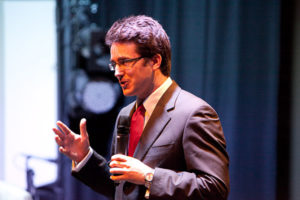 Simon is a very busy man. As we approach the International Convention in Vancouver, our District 91 International Speech Contest winner spends his spare time hopping on and off trains travelling to practice his two contest speeches in clubs across the district. Nigel Oseland (NO), our new D91 PR Manager caught up with Simon Bucknall (SB) on a slow and noisy train from Kent.
Simon is a very busy man. As we approach the International Convention in Vancouver, our District 91 International Speech Contest winner spends his spare time hopping on and off trains travelling to practice his two contest speeches in clubs across the district. Nigel Oseland (NO), our new D91 PR Manager caught up with Simon Bucknall (SB) on a slow and noisy train from Kent.
NO> Simon, I’m quite good at accents but can’t quite place yours; in Hamwic Speakers’ video of the District 91 Contest, you appear to be based in middle-England.
SB> I live in Streatham in South London, Guy applied artistic license to the outside of the house, but I was interviewed at the piano in my living room. I’m originally from Worcestershire but we move around a lot and I have lived in twelve different places.
NO> What inspired your winning speech on honesty?
SB> A speech is usually inspired by something that has happened to you, a story, or by a message that you think is important and believe in. For me it was a bit of both, honesty is important to me and I knew I wanted to give a speech on it. But the most memorable speech I have heard was by a young boy that confronted an audience, he wasn’t political, just honest and made a big impression. So, I brought the two thoughts together.
NO> How do you go about preparing for something as big as Vancouver?
SB> It helps by thinking of it as your legacy, that keeps you on the straight and narrow – what will you say, what are your values, what is your message?
NO> And how many times have you amended your winning speech?
SB> I’ve had around 25 iterations of the speech over a period of five months. You have to refine your speech over time, cut out unnecessary stuff to give a really clear message and think about what you want to achieve for your audience. Take care with taking on board advice, filter it but keep an open-mind on how to put across your message. My opening is now totally different to previous versions.
NO> Do you have any advice for future contestants?
SB> Record your speech, then listen and improve. When you have delivered your speech from a Toastmaster manual that is the end of the road, whereas in a contest it is the beginning. A good reason to enter contests is that, not only do you push yourself, but you get to make the same speech numerous times, and improve upon it each time. We certainly learn more in the contest process – it accelerates the learning curve.
NO> I’ve often wondered how you balance preparing a speech so it is delivered well against it appearing too polished and unnatural.
SB> Keeping a speech natural and passionate each time it is delivered is a big challenge that doesn’t go away. I start with a script that is honed and then rehearsed. The scripting helps me with the technical aspects of the speech, the language and structure. But the trick is through practice to internalise rather than memorise the speech. Eventually you become so familiar with the speech that it becomes natural again – it’s like learning a new language.
NO> What are you looking forward to the most in Vancouver?
SB> The experience of giving a speech at such a high level and the last fifteen to thirty seconds of the speech when I will hammer home the message.
NO> Which came first Toastmasters or your coaching and presentation skills consultancy?
SB> Oh Toastmasters, I joined in 2004 and had no intention of speaking professionally. I’ve had various jobs and I just wanted to make better presentations at work. But, thanks to Toastmasters, I went professional around three years after joining.
NO> In the video of the district contest you are playing Moonlight Sonata on piano. Will you play on, and who are your musical inspirations?
SB> Playing piano is something I have aspired to for years. So, I will continue, I have my grade 3 and will be playing at a showcase soon. Playing an instrument is hugely helpful for creativity – it’s just nourishing. I love Arcade Fire and their huge range of instruments, but there is something special about Beethoven – hearing his music is like him being in with the room with you, it makes a deep connection.
See more of Simon, as he is interviewed by Mel Sheppard.
